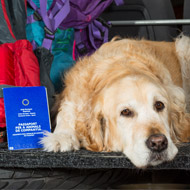Government issues guidance on pet travel after Brexit

Pets must be effectively vaccinated against rabies before they travel.
The Government has issued advice to pet owners planning to travel to Europe after Brexit.
The advice states that in the event of a no-deal Brexit, pet owners may need to take additional steps before travelling. This includes a rabies vaccination followed by a blood test a minimum of 30 days later.
Pet owners planning to travel after 29 March 2019, should contact their vet at least four months ahead of travelling to get the latest advice, the advice states. If they intend to travel on 30 March 2019, for example, then they must discuss what is required with their vet before the end of November 2018.
Under the requirements, pets must be effectively vaccinated against rabies before they travel. This includes having an up-to-date rabies vaccination and a blood test to show sufficient levels of rabies antibody.
This blood test must take place at least 30 days after any initial rabies vaccination and a minimum of three months before the travel date. UK chief veterinary officer Christine Middlemiss urged pet owners to talk to their vet about health requirements in good time.
“Today we are giving practical and straightforward advice for people who wish to travel to Europe with their pets after we leave the EU in the unlikely event of a no-deal situation,” she said.
“I urge all pet owners who wish to travel immediately after 29 March 2019 to consult with their vet as soon as they can. This is about planning ahead to ensure their pet has the correct health protection documented and in place for all possible Exit scenarios.
“In recent weeks we have been in contact with vets to highlight this issue. They are expecting pet owners to consult with them and plan ahead.”



 The latest
The latest